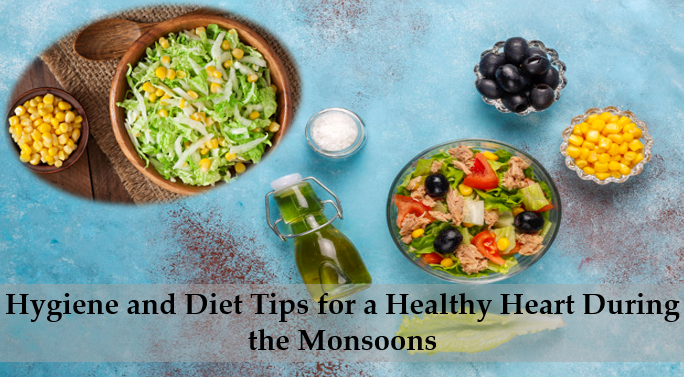Monsoons have arrived just at the right time to provide us a cool break from the scorching summer. However, the cool monsoons also bring a host of woes by increasing the risk of common health problems like cold, cough, flu, and viral fever if proper care is not taken. While heavy rains and stagnant rainwater can breed mosquitoes, the humid climate makes the human body is more susceptible to viral risks, fungal infections, and skin diseases during this season.
The change of season and the changes it brings in the surrounding can increase the risk of air-borne and water-borne diseases which can further make it tough to recover for heart patients. It is extremely important to take preventive measures during this monsoon while simultaneously strengthening the immunity to raise your guard if you are suffering from a heart condition. And by adopting healthy hygiene and switching to the heart-friendly, immunity-boosting diet you can ward off the risk of health problems. So, read on to know them:
Hygiene & Diet Tips for the Monsoons:
Avoid street food:
The cool and windy climate out there might tempt you to have those hot pakoras, samosa, and other street food but street food is a strict no during the monsoons. Not only are they made in unhygienic places but the vegetables or leafy greens they use to make them are more susceptible to carry worms, pathogens, and other germs which further can turn tables on your health.
Consume fresh fruits, vegetables & home-made fresh food:
Sticking to home-made fresh food is the safest possible choice during the monsoons since it is easy to maintain a heart-healthy diet with homemade food. Fruits, especially the seasonal ones are perfect for these monsoons since they house the right nutrients that go well with the weather. As for the raw vegetables, make sure you consume them only after boiling. Consuming herbal teas with spices can give a helping hand to your immunity during the monsoons.
Minimize, if possible avoid meat:
Just like the human body is vulnerable to diseases and infection during the monsoon, animals are susceptible to the infections due to bacteria, virus, or other allergens which can pass into the human body. Since the feed/fodder given to the animals can be rife with the disease-causing organisms, consuming the meat can be risky and must be avoided if possible.
Maintain a strict personal hygiene routine:
Wash hands with sanitizer or soap regularly to protect yourself from the viral fevers, flu, cold, and other infections. Keep your feet clean, workout/walk at home and avoid getting wet in rain; carry suitable clothing, and protect yourself in case you cannot avoid it.
Stay hydrated with safe water:
It is common to feel thirsty during the rainy season, however, the body needs its water regardless of the season. Since optimal water intake boosts your digestion and flushes toxins from the body which naturally decline with age, it is very important to stay hydrated to stay healthy during monsoon. Don’t let the rainy season to cut the total water intake, stay hydrated with safe and pure water; boiled water is recommended.
Keep the household clean & dry:
Make sure you get rid of damp areas and stagnant water in the household to avoid breeding of mosquitoes. Ensure that the rainwater does not pool anywhere near the household as they are common birthplaces of disease-causing mosquitoes. Use mosquito repellent creams and mosquito nets, if necessary, to shield the doors and windows to keep them at bay.
As monsoons increase the risk of diseases and infections which further puts a burden on the heart, heart-patients need to adopt above hygiene and diet tips during the monsoon. If you need more info on the above information and would like to consult a heart specialist for further help, Dr. Alla Gopala Krishna Gokhale is the Best Heart Specialist in Telangana and you can contact him here: http://blog.drgokhale.com/













